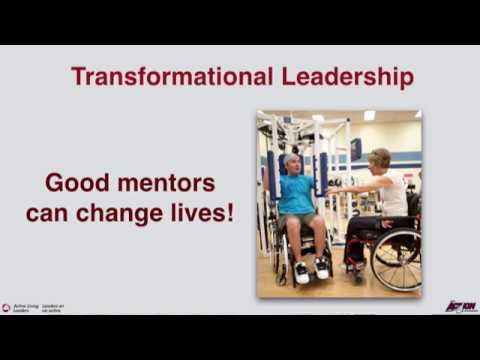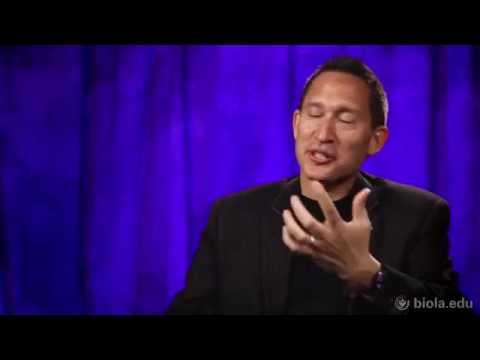
Section two: Transformational Leadership The goal of this module is to introduce you to the concept of transformational leadership and illustrate how you can use principles of transformational leadership to motivate others to become and stay physically active
Here, you will learn the principles needed to be a transformational leader, and peer mentor, who supports others with a physical disability to become and stay physically active A good peer mentor is an individual who has faced a particular experience and thrives in spite of the challenges And so, is better equipped to provide counsel, and empathetic understanding, to another person through a comparable experience As most peer mentors with disabilities are well-adjusted individuals who have, overcome challenges associated with their disabilities, they are better equipped to provide motivation, hope, and comfort to individuals seeking support; leading to increase engagement, self-confidence, social connectedness, and overall well-being and happiness Your role as a peer mentor is invaluable, as good peer mentors have the ability to positively change the lives of the people they interact with
A peer mentor is also a leader, and has the capacity to guide or lead a mentee to reach goals they never thought possible It's important to remember that, wonderful peer mentors, and leaders, are able to positively influence and elevate mentees; while complacent and unenthusiastic mentors can have a negative influence It is here that you must ask yourself, which do you want to be A good mentor can take a person to places they would not have gone by themselves, and get them to do things the otherwise would not have done Because (a) they want to do it, and (b) they understand why
One point that's really worth noting is that, mentorship is not a matter of giving a large amount of advice, all the time But instead, really effective mentoring is about moments It's about understanding how specific behaviors and actions, no matter the size, affect other people And that those behaviors and actions can help change lives One way that you can become a more effective mentor, and leader, is by learning, adopting, and focusing on the behaviors associated with transformational leadership
Transformational leaders are individuals whose actions transcend one's own self-interests; with the purpose of empowering, inspiring and challenging others to achieve a higher level functioning Transformational leaders try to maximize the quality of the relationship with others by empowering, motivating, and encouraging the people they interact with Transformational leaders challenge others to go beyond what they thought was originally possible, and provide undivided support to assist with the personal development of the people they lead So why transformational leadership? Why even look at this style of leadership behaviour? Well, we all understand that good leaders have really strong and positive effects on others; while bad leaders have really strong negative effects on others In terms of this specific style of leadership, research has shown that, leaders who use behaviors associated with transformational leadership consistently improve several key outcomes of the people they lead
including their attitudes, motivation, performance and overall well-being This style of leadership has also been studied in a wide variety of contexts including business settings, education settings, in the military, and most recently with spinal cord injury peer mentors; confirming its effectiveness in a host of different situations Over the past two and a half decades, there has been more research performed investigating the effect of transformational leadership behaviors on follower development compared to all other leadership styles combined We can also see that, compared to the other four styles of leadership, transformational leadership is the most active form As well as the most effective form, with respect to follower development
The extensive amount of research that has investigated transformational leadership has increased our confidence in understanding while the importance of teaching all leaders including mentors about how they can use transformational leadership behaviors to become better leaders idealize influence inspirational motivation intellectual stimulation and individualized consideration are often referred to as the four eyes of transformational leadership and are the four behavioural dimensions that form the foundation of transformational leadership by using behaviors associated within each of the four behavioral dimensions the four eyes leaders are able to become more transformational and more effective at leading together we will examine each of these behavioral dimensions in more detail and learn how we can use behaviors associated within each dimension to become more effective mentors and encourage physical activity participation for Monte's the first behavior dimension we will examine is idealized influence idealized influence takes place when leaders foster trust and respect among others and model ethically desirable behaviors through the demonstration of personally held beliefs idealized influence involves a leader acting as a positive role model displaying the behaviors he or she wishes their followers to adopt mentors can gain the trust and respect of their mentees by always doing what is right rather than what is convenient being consistent and dependable following through on their words and practicing what they preach here is a great quote that is truly reflective of the concept of idealized influence you believe in something you stand up for you try to pull together a team of people who can be inspired by that same vision and then help encourage people to add value by putting their unique talents to the task and you treat everybody with respect no matter what role they're playing this quote by Rick Hanson reiterates the importance of demonstrating personal values by being a strong positive role model for your mentees now that we have a general understanding of what it means to be an idealized influence for our mentees let's take a look at how we can use specific behaviors associated with idealize influence to encourage our mentees to be physically active first let's examine how you can ensure that you are being a positive role model it's important as a mentor to outline why you value physical activity and what your beliefs are relative to staying physically active this may be sharing with your mentee that you believe that staying physically active can help increase independence or that you have been able to become more socially active by engaging with other people to participate in the same physical activities as you by talking about the activities that you currently participate in you'll be demonstrating to your mentee that you not only preach about being active but are also active yourself this will help you gain the trust of your mentee as they may feel more convinced to listen to your advice as you have real-world experiences related to the topic you are discussing it's important as a mentor to not only act as a role model but to also lead by example this can mean talking with your mentee about your personal experiences or showing that you are prepared to go above and beyond what is expected by committing to attend activities with them as a mentor you should avoid saying or recommending anything to your mentee that you yourself are not knowledgeable about or not willing to do as an example if you advocate for your mentee to join an accessible gym in order to stay active then you as a mentor should be willing to attend the gym once or twice with the mentee if they ask for support make sure that you always follow through with whatever you say to your mentee this will help to build mutual trust and respect in the relationship the last element of idealized influence we will discuss is the importance of being energetic engaging and respectful during interactions always have a positive attitude when discussing physical activity opportunities or ideas with your mentee as enthusiasm and optimism can be infectious if you are excited and engaging when discussing activities it may help your ante become excited about the activities as well also remember to respect your mentees ideas and be encouraging and positive whether or not their ideas align with your interests for example if your mentee thinks they may like to play tennis be positive and encouraging about opportunities even if you yourself have little interest in playing during your interactions with your mentee you should attempt to identify potential challenges that your mentee may face with regard to participating in physical activity as we can see by the example on the slide your mentee may not be able to drive themselves to the activities they want to participate in using behaviors associated with idealize influence you can help solve this challenge by discussing your personal experience using different forms of public transportation to attend activities and offer to assist them their first time and remember always practice what you preach so in this example make sure you follow through with your promise to help them organize and take transportation their first time now that we know about idealize influence let's examine the next behavior dimension the second behavior dimension we will examine is inspirational motivation inspirational motivation can be defined as the communication of high expectations through which leaders inspire and energize others to their goals inspirational motivation involves a leader in this case you the mentor raising the expectations of your mentee and convincing them that they can achieve beyond what they thought they were capable of it's extremely important to always remain optimistic and enthusiastic and while the goals your mentee can achieve and help them to set high but achievable standards here we have another great quote from Rick Hanson it reads the goal you set must be challenging at the same time it should be realistic and attainable not impossible to reach it should be challenging enough to make you stretch but not so far that you break as a mentor you are responsible for helping to form goals alongside your mentee ensuring that goals are challenging attainable and promote personal growth with regard to physical activity the goals you helped set with your mentees should attempt to either improve their current participation or help to encourage initiation in new physical activities now that we have a general understanding of what it means to provide inspiration motivation for our mentees let's take a look at how we can use specific behaviors associated with inspiration of motivation to encourage our mentees to be physically active first let's examine how you can encourage mentees to leave their comfort zones it's important as a mentor to try and be aware of the physical activity opportunities and events available to your mentee although it's impossible for you to be aware of all the opportunities available to your mentee you should at least try to stay up to date with accessibility programs and opportunities in and around your area by being aware of several different activities that are available to your mentee you can help to facilitate participation and encourage them to leave their comfort zone and try one of the activities if your mentee is nervous about trying a new activity you can recommend that they begin by participating in an activity that they feel less intimidated by and slowly work their way through the different opportunities when people hold high expectations of others they tend to perform better this is why it's important as a mentor to show your mentee that you believe in them and that you are confident they can become physically active encourage your men to you when they have doubts about their abilities by being enthusiastic and optimistic they can achieve their goals if your mentee is discouraged because they are having difficulty with an activity then offer to participate them assist them in the activity this offer will demonstrate to your mentee that you are committed to improving their well-being as you are willing to take the time to physically help and engage with them in the activities they may be nervous about participating in the last element of inspiration motivation that we will examine is the importance of challenging your mentees is that meaningful and challenging goals that promote personal growth always make sure that the goals you help your mentee to set are meaningful important and reflect the individual needs of the mentee you may be tempted as a mentor to set goals for your mentee or encourage them to participate in activities that you yourself enjoy without acknowledging that your mentee may not share your interests by engaging your mentee and having them participate in the goal-setting process you can help ensure that the goals that are made are meaningful thus and helping to motivate your mentee to achieve them as a mentor it's also important to be aware of how to set goals with your mentee on the next slide we will discuss a common method for developing goals describe the setting smartie goals understanding how to set effective goals is extremely important as a mentor a common method to help ensure you are setting goals that will motivate your mentee is to set goals that are specific measurable action-oriented realistic time-based and important to your mentee setting smartie goals can help bring structure into the goals and objectives you set with your mentee instead of vague resolutions about becoming physically active smartie goal setting creates verifiable trajectories towards being physically active with clear milestones in an estimation of the goals attainability an example of a smartie goal would be to have your mentee engaged in 30 minutes of physical activity two days a week and have them add another day each subsequent week with the end goal being that after four weeks your mentee will be engaged in 30 minutes of physical activity five days a week a goal like this seems complicated but in reality addresses all the key components that comprise a smartie goal on the next slide we will briefly discuss each component involved when setting a smartie goal a smartie goal is defined as one that is specific measurable action-oriented realistic time-based and important a specific goal is a goal that outlines what the specific goal is how the goal will be achieved and why the goal is made in the first place a measurable goal is a goal that allows you and your mentee the ability to track progress any goal that you create should have a defined end point so that your mentee will know when they have accomplished the goal an action-oriented goal clearly defines the actions that need to be taken in order to successfully achieve the goal a realistic goal is a goal that still challenges your mentee but is not so difficult that they get discouraged or lose motivation Holy's tried to set challenging goals that are realistically achievable time-based goals always have a timeframe without setting a timeframe there is no urgency to work towards the goal always try to set realistic timeframes with your mentee to motivate them to achieve a goal in a certain amount of time lastly all goals you helped to create with your mentee should be important to your mentee if the goal is not important then it will be difficult for your mentee to take a genuine interest in working to achieve it by creating goals with your mentee that are specific measurable action-oriented realistic time-based and important you can increase the effectiveness of the goals you make during your interactions with your mentee you should attempt to identify potential challenges that your mentee may face with regard to participating in physical activity as we can see by these ample on the slide your mentee may not be overly motivated to participate in physical activity using behaviors associated with inspirational motivation you can help solve this challenge by helping to set goals that are meaningful to your mentee and being enthusiastic and optimistic that they can achieve them as a mentor you can take this one step further by offering to accompany them during their first few physical activities demonstrating your support and belief in them to adopt a new healthy active lifestyle now that we know about inspirational motivation let's examine the next behavior dimension the third behavior dimension we will examine is intellectual stimulation intellectual stimulation involves encouraging others to see issues from multiple perspectives and question their own and others commonly held assumptions when interacting with your mentees remember that mentorship is a relationship involving both the mentor and the mentee keeping that in mind when attempting to help solve the challenges and faculties that your mentee is facing remember to include them in the discussion instead of telling your men to you what to do try to foster their independence and autonomy by encouraging them to think of their own solutions challenge them to think outside the box in brainstorm alternative solutions to their problems here we have a quote from one of the best athletes of all time it reads obstacles don't have to stop you if you run into a wall don't turn around and give up figure out how to climb it go through it or work around it as a mentor you are responsible for helping to brainstorm a variety of different solutions to the challenges and problems your mentee is facing as an example if your mentee is having trouble affording a membership to a gym help them to brainstorm other forms of physical activity they can participate in that are more affordable this could be going for a walk or we allow side doing bodyweight exercises at home or purchasing less expensive exercise equipment like exercise bands always remember that there is more than one way to solve a problem that it's important to encourage your mentee to think of their own solutions now that we have a general understanding of what it means to provide intellectual stimulation for our mentees let's take a look at how we can use specific behaviors associated with intellectual stimulation to encourage our mentees to be physically active first let's examine how you can encourage mentees to tackle old problems in new ways as a mentor prepared to interact with your mentees who are having a hard time either staying physically active or engaging in physical activity because of limitations associated with their disability these limitations can be anything from physical limitations that restrict their ability to perform certain movements to inaccessible facilities in their area preventing participation no matter the problem help encourage your mentee to look beyond their disability by helping them solve small problems first gradually working your way to solving the larger ones by helping your mentee complete tasks they thought were impossible you'll be helping to build their confidence that they can overcome the barriers that are challenging them to be physically active when brainstorming new ideas to help your mentee overcome their challenges ensure that you are allowing them to think of ideas on their own although it's important for you as the experienced mentor to share your own ideas the main goal of intellectual stimulation is to encourage your mentee to think for themself you can do this by facilitating the conversation so that both you and your mentee are equally involved after you share an idea encourage your mentee to respond to your suggestion and share an idea of their own this back and forth style of discussion will promote the sharing of new ideas from both yourself and your mentee which will encourage your mentee to continue to think critically about other challenges they may face the last element of intellectual stimulation we will discuss is how you can help your mentee to develop their own creative solutions to problems this can be achieved by creating an accepting and supportive atmosphere when interacting with your mentee and by showing genuine interest in your mentees ideas and values allowing your mentee to express their own opinions in a supportive and judgment-free atmosphere will help to facilitate more conversation as your mentee will feel comfortable that their ideas matter to you that you respect their opinions the more comfortable you can make your mentee feel the better they will feel more confident about opening up to you and expressing their true self as we can see by the example on the slide your mentee may not be overly motivated to participate in physical activity because they are not aware of the benefits associated with being physically active using behaviors associated with intellectual stimulation you can help solve this challenge by helping your mentee to realize the possible benefits they are missing out on encourage your mentee to share why they think physical activity might be good for them and also provide some resources for your mentee that highlight the benefits of being physically active ensuring that you are not simply telling your mentee everything remember try to foster independent thought from your mentee and encourage them to think critically about their problems now that we have discussed intellectual stimulation that's examined the last behavior dimension the fourth and final behavior dimension of transformational leadership is individualized consideration individualized consideration takes place when leaders respond to the personal and psychological needs of others and display a genuine sense of care and concern for their followers individualized consideration can best be summarized as treating each mentee as a unique individual understanding that each mentee will have their own unique needs and will respond to your mentorship in different ways as a mentor make sure to engage in eye contact when name to your mentee this will show that you are completely concentrated on hearing what they have to say listening intently you will enable you to provide specific feedback that is based on the concerns your mentee has outlined rather than providing generic feedback that may not be as applicable or relevant by recognizing a specific psychological and physical needs of each mentee you'll be able to foster trust and respect from your mentee as you will have demonstrated that you genuinely care about them as an individual here we have a quote from one of the most successful coaches of all time it reads seek opportunity to show you care the smallest gestures often make the biggest difference as we had talked about earlier in the presentation mentoring is often about doing the small things that could have a large impact on the person you are mentoring small gestures like making eye contact when talking and listening to your mentee can show that you are genuinely interested in what they have to say and that you care about them as a person always remember that every person is unique and different because of this need to be treated as a valued unique individual now that we have a general understanding of what it means to provide individualized consideration let's take a look at how you can use specific behaviors associated with individualized consideration to encourage your mentees to be physically active first let's examine how you can treat each mentee as a unique and value individual as a mentor understand that every mentee you interact with is unique in that they will react and respond to your mentoring in different ways talk with your mentee about their specific needs regarding physical activity and thank them anytime they share information with you you can show that you value your mentees thoughts and opinions by being supportive of their ideas in providing advice that is specific to their situation understand that just as you like to be praised and acknowledged for the unique attributes that make you who you are so will your mentee one of the most important skills you can develop as a mentor is the ability to be an effective listener effectively listening requires you to give your full attention to your mentee when they are talking allowing them to finish before you respond all while remembering the key points you want to address it's good practice to bring something to record ideas on while you listen to your mentee to ensure that you do not miss any important details with regard to encouraging physical activity effective listening can mean listening to the likes and dislikes of your mentee so you can provide physical activity options that are aligned with their interests the last element of individualized consideration we will discuss is how to give specific personalized feedback or advice that is reflective of your mentees individual needs with so many different factors influencing whether or not someone engages in physical activity it's crucial that as a mentor you avoid making generic comments or blanket statements such as you can become active you just need to try harder statements like these are too general and do not demonstrate to your mentee that you understand their specific needs the more specific you can make your feedback the more likely your mentee will feel that you are truly interested in helping them solve their exact problems or challenges as we can see by the example on the slide your mentee may be interested in becoming physically active but might not be aware of the affordable activities they can participate in rather than give the general feedback like a lot of people are restricted financially just like you and find ways to stay active which sounds demeaning get creative with your mentee and think of specific activities your mentee can participate in remembering that every person reacts to advice differently try to brainstorm several ideas that are specific to your mentees challenges to allow for a wide range of options they can consider the most important thing to remember when trying to incorporate transformational leadership behaviors into your mentoring is that it does not have to be an all-or-nothing approach there will be times when you'll be able to use behaviors from all four dimensions during your mentoring and other times when you may only be able to use behaviors from one the best thing you can do is be aware of the four behavior dimensions and be comfortable using the behaviors incorporated within each dimension so that you can be an effective transformational leader no matter the situation we will end the presentation with a quick quote that will hopefully encourage you to practice using transformational leadership behaviors not only during your mentoring but in your everyday life the quote reads learning is defined as a change in behavior you haven't learned a thing until you can take action and use it without practice you will never become a transformational leader so with that in mind do your best to practice as often as possible and now please refer to your handbook for information on how you can practice using these transformational leadership principles we would like to acknowledge the contributions of Robert Shaw and dr mark Beauchamp who developed the content of this program you









